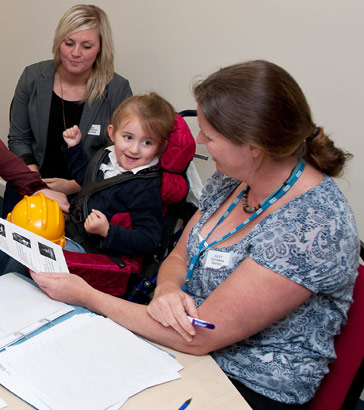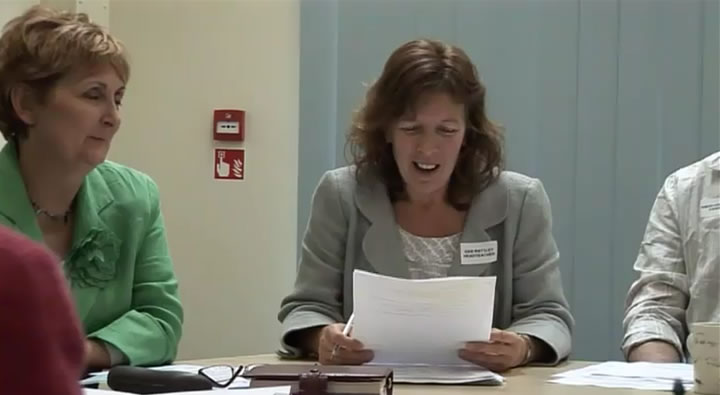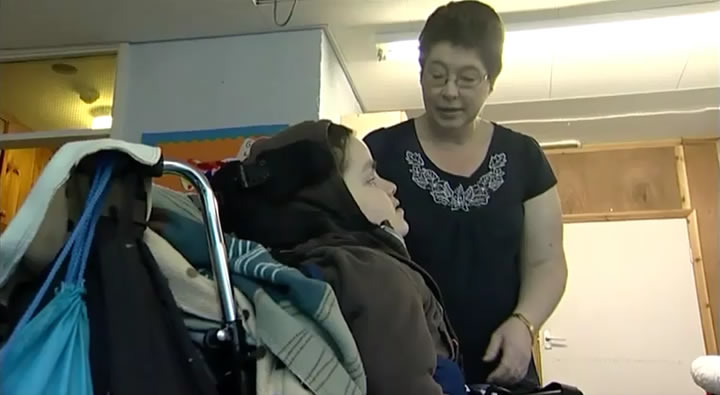
There are a range of services provided for children/young people with disabilities including:
- Mobility aids;
- Adaptations to the family home;
- Speech and language therapy;
- Physiotherapy;
- Play groups;
- Home education programmes;
- Respite care.
Sometimes, the absence of essential services can hinder a child's/young person's independence and achievement.
Sophia spends some of her time in a mainstream school and some in a special school. She needs a 'Tech/Talk' to help her communicate but, at present, she uses it only in her special school setting.
Watch this clip from Sophia's review in which the availability of Tech/Talk is discussed.
Now listen to Simon, Harvey's dad, talk about the lack of support for Harvey's speech and language needs.

arrangements are
made in your school
for the provision and
allocation of:
- Physical resources (equipment);
- Human resources
(staff and
volunteer time).
Local authorities must provide 'all or any' of the welfare services listed in the Chronically Sick and Disabled Persons Act (CSDPA) 1970, where they assess that the relevant need exists. However, they may set eligibility criteria, which can vary greatly between regions, resulting in children/young people with the same needs receiving different levels of support depending on where their family lives. The Chronically Sick and Disabled Persons Act (CSDPA) 1970 (Section 2) lists the following welfare services:
Practical assistance at home
Meals
Holidays
Educational facilities
Recreational facilities
Media
Telephone equipment
Travel assistance
Home adaptations
Return
Return
Return
Return
Return
Return
Return
Return
Return

It is legitimate for local authorities to use eligibility criteria in order
to prioritise those most in need of services, though these procedures must
be transparent and comply with the public sector equality duty under section
149 of the Equality Act 2010.
Eligibility criteria can vary greatly between authorities, so children/young people
with
the same needs may receive different levels of support depending on where
their family lives.
The need for guidance on the consistent use of eligibility
criteria for children/young people was identified by a judicial review, R(JL) v. Islington
London Borough Council (2009), known as the `Islington Judgement`. However, no such
formal
guidance has yet been forthcoming.
Children/young people with complex needs often have frequent and/or extended stays
in hospital.
Travel associated with attending hospital appointments should be supported
by health services. Where a child's/young person's disability makes transport difficult,
the hospital should provide an ambulance or hospital taxi.
Where a child's/young person's disability allows the use of ordinary transport, families
on low income may receive support from health services, depending on their
particular circumstances.
Where travel costs are associated with the
family visiting a child in hospital,
then these may be met by Children's Services under the Children Act 1989.
The National Service Framework (NSF)
states that `hospital stays should be kept to a minimum`, but also that the needs
of carers should be considered when a discharge from hospital is planned. If a child/young
person needs to attend hospital appointments in relation to their disability, then
travel to and from hospital should be supported by health services.

Local authorities must take reasonable steps to identify the extent to which there are parents within their area who have needs for support (Clements, 2014). While the needs of parent carers are assessed within a holistic assessment of their child's needs under the Children and Families Act 2014 (section 97) and the Children Act 1989 (section 17), they can also be assessed independently.
The Care Act 2014 (which comes into force in April 2015) includes the strongest rights and recognition for carers (including parents) in the Social Care system yet, for the first time giving them a clear right to receive services.
Young carers' needs are supported under the Children and Families Act 2014 up to the age of 18 years, and subsequently under the Care Act 2014. Their needs during their transition from child to adult services must be considered under the Care Act.
(Clements,
2014; Irwin Mitchell, 2014; NHS Choices, 2014)
Explore the Carers UK website for further information: http://www.carersuk.org Their 'Assessments' factsheet is available here.
Listen to this clip in which Caroline, the mother of a child with complex
needs, talks about how important respite care and the care provided by a
children's hospice is for her family's quality
of life.

The local authority must consider the well-being of parent carers. Well-being (as defined by the Care Act 2014) includes: personal dignity and respect; physical and mental health, and emotional well-being; protection from abuse and neglect; control by the individual over day-to-day life (including over type and delivery of any support) (Aspland, 2014).
Parent carers of disabled children often need support to enable them to care effectively for their child with disabilities. The Local Offer must give contact details of support groups and other services/facilities able to support parent carers of disabled children. It must also include a short breaks duty statement that describes, provides access details and eligibility criteria under the Breaks for Carers of Disabled Children Regulations 2011 (Irwin Mitchell, 2014).
Local authorities must assess parent carers on the appearance of need. The parent carer assessment must involve the parent carer themselves, the children for whom they have parent responsibility, and any other person whom the parent carer requests that the local authority involves (Clements, 2014).
Until April 2015, when the Care Act 2014 comes into force, assessment of adult carers of a young person over 18 years was carried out under:
- Carers (Recognition of Services) Act 1995 - rights to assessment;
- Carers and Disabled Children Act 2000 - additional rights to support services and payments;
- Carers (Equal Opportunities) Act 2004 - local authorities must inform carers of their rights and consider their wishes around work, education, training or leisure.
To be assessed under this legislation, the carer had to show they provided 'a substantial amount of care on a regular basis'. Support, access to assessment and the range of support offered was at individual local authority discretion.
Under the Care Act 2014, the 'substantial care' requirement has been replaced by a new requirement for the local authority to assess when the carer 'may have needs for support – whether currently or in the future'. Local authorities must assess when it appears that:
- The carer is likely to have support needs on their child becoming 18;
- Support will be of significant benefit to the carer.
This is also the case under the Children and Families Act (section 97). (Clements, 2014; Irwin Mitchell, 2014; NHS Choices, 2014)
Explore the Carers UK website for further information: www.carersuk.org.

Even before their child with disabilities reaches 18 years, carers needs should be assessed or reviewed, as part of the child's transition planning, to 'explore the impact of changing circumstances on the carer' (Irwin Mitchell, 2014).
The local authority has the power to provide support whether or not the child and carer have previously received services under social care or an Education, Health and Care (EHC) Plan.
The assessment must consider, with reference to the national eligibility threshold:
- The carer's ability/willingness to continue to provide care;
- The impact of caring on the carer's 'well-being';
- The carer's wishes regarding
day-to-day outcomes; - The carer's wishes regarding their own work, education, training and/or leisure;
- Any benefit for the carer from providing preventative services, information and advice.
Where a carer is assessed as having an eligible need, the local authority has a legal duty to meet those needs.
(Irwin Mitchell, 2014)

Legislation and guidance
- Chronically Sick and Disabled Persons Act 1970
- Children Act 1989
- Carers (Recognition of Services) Act 1995
- Carers and Disabled Children Act 2000
- Carers (Equal Opportunities) Act 2004
- Children, Young People and Maternity Services National Service Framework (Department for Education and Skills/Department of Health, 2004)
- National Health Service Act 2006
- Children and Young Persons Act 2008
- Equality Act 2010
- Breaks for Carers of Disabled Children Regulations 2011
- Children and Families Act 2014
- Care Act 2014

Other publications
- Aspland, D. (2014) 'The 11th hour: caring for parent carers'. [Online at: http://www.specialneedsjungle.com/caring-for-parent-carers; accessed: 17.1.15]
- Clements, L. (www.lukeclements.com)
(2014) 'The Care Act 2014 and the Children and
Families Act 2014' (Presentation). Cardiff: University of Cardiff. [Online at: http://www.lukeclements.co.uk/wp-content/uploads/2014/11/Care-Act-Overview-Handout-
2014-01.pdf; accessed: 17.1.15] - Irwin Mitchell (2014) 'Duties to parent carers and carer's assessments'.
[Online at: http://www.irwinmitchell.com/medialibrary/IM%20COM/Home/Documents/Children%20
and%20Families%20Act%202014/PLS-AP41-CFAct_9_Duties.pdf; accessed: 2.1.14] - NHS choices (2014) 'Carers rights and the Care Act'. [Online at: http://www.nhs.uk/Conditions/social-care-and-support-guide/Pages/carers-rights-care-act-2014.aspx; accessed: 17.1.15]
Media
- Carers UK: http://www.carersuk.org


